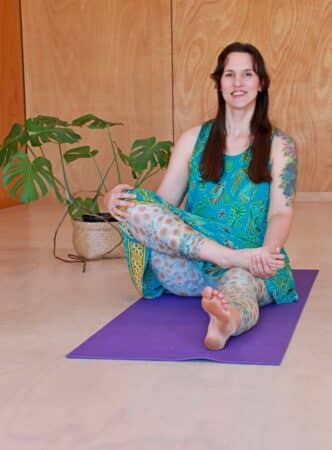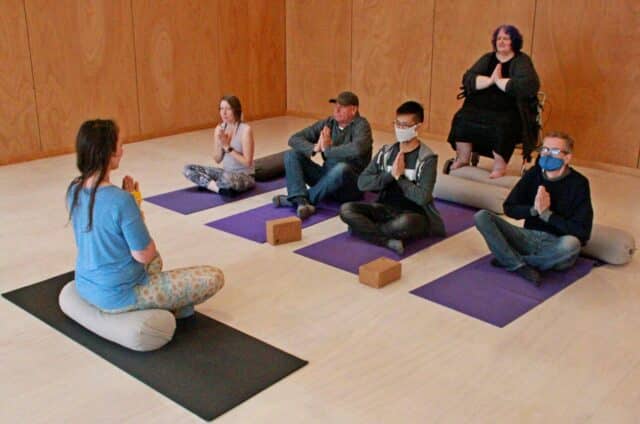Yoga Club is by and for autistic people. Nicolina Newcombe writes about how they use restorative yoga, basic breathing methods and yoga nidra to build stronger connections to their bodies. Yoga Club is informed by tradition and inclusive for the group of Voices from the Spectrum members.
I HAVE ENJOYED yoga for many years as a non-competitive opportunity to engage in slow and accurate movement. It was only since my autism diagnosis that I came to value yoga as having the capacity to increase my awareness and help me regulate my emotions. After witnessing someone who communicates differently being excluded from yoga, I set a goal to create an inclusive yoga class where people can stim, make noises, and take breaks.
Becoming a yoga teacher
I was fortunate to go to Anahata Yoga Retreat in Tākaka, Golden Bay and certify as a yoga teacher in the Bihar tradition. The Bihar tradition emphasises parasympathetic nervous system activation, using isolated movements that are simple and gentle enough to be completed without discomfort. Unlike other forms of yoga that require standing and strength, we rest and relax.
Starting Yoga Club
I did my yoga teacher training practicum with fellow Voices from the Spectrum members, a peer-support group run by and for autistic adults in Hamilton. The feedback was so positive, like when Sarah said, “it helped totally relax me and get rid of the physical and mental tension I carry with me most of the time”, and Barbara said, “my breathing has felt more consistent”, that we decided to start Yoga Club.
To make Yoga Club as inclusive as possible, members are sent a PowerPoint presentation with photos of the yoga studio space and information about Yoga Club to give them the best idea about what to expect. We meet in a dedicated studio so we have a private clear open space with no other distractions. The studio has a comfortable lounge attached where we can meet up before and after Yoga Club to socialise. We talk about what is going well and what we want to do. Finally, like most Voices from the Spectrum groups, Yoga Club is free.
Possible benefits
Autistic people might derive benefits from yoga. We are much more likely to experience interoceptive challenges. This means many of us find it hard to read what is happening in our bodies based on cues like pain, temperature and blood pressure. Interoception is part of regulating emotions. Becoming more aware of our internal physiology contributes to managing anxiety and improving our sense of wellbeing. We believe consciously practising interoception in the controlled environment of a yoga studio supports engaging with sensations in the everyday world.

At Yoga Club, we practise things like feeling how air moves around our lungs when we raise our arms in different directions, experimenting with abdominal pressure, and listening to our heartbeat before and after asana.
Asana, such as extending our fingers out wide, rotating our wrists, or bending and straightening our elbows, are coordinated with our breath. We also hold relaxation poses for around two minutes. Ample use of bolsters and other props like blocks and blankets ensure our whole bodies can let go and be held by the surfaces beneath us. A key aspect is resting between practices to notice any changes in our bodies.
We do yoga nidra at the end of each session. Yoga nidra is a guided meditation with eight stages, including personal intention, systematically bringing attention to each body part, counting our breaths, imagining sensations, and visualisations. We practice with minimal stimulation, laying on our backs with our feet apart, hands clear, and eyes closed.
These activities develop interoceptive recognition and accuracy by focusing conscious awareness on one element of the body at a time, such as a joint, connection point, breath, or pulse.
Member stories
Yoga Club is “hugely significant” for Barbara as she has a breathing condition. “I like the gentleness of it and the gentleness of using my limbs”, she said. Barbara tried yoga when she was young but gave up. However, “Yoga Club makes me feel really comfortable and welcome and encourages me to attend”. The best part of Yoga Club for Barbara is “matching my breathing with my movements; you would think it would be easy but it is really difficult”.
Gaby is practising yoga for the first time at Yoga Club. He said, “my favorite part is being so relaxed I fall asleep. It is a fulfilling experience to focus on nothing but myself”. Gaby appreciates having our own Yoga Club. “It is important for us that we have our own space”, he said, adding to the positives, “there are no expectations”.
Sarah felt awkward and self-conscious doing yoga in the past but feels physically and socially comfortable at Yoga Club. “There is room to be ourselves without fear of doing the wrong thing”, she said. She has found our approach useful, saying, “it focuses on connection to the body rather than pushing the body to extremes”. “I really appreciate the ritualism in the way movements are timed to our individual breathing, the repetitions, and the familiarity of the structure of the session”.
Personal reflection
I feel a deep sense of peace and satisfaction when teaching yoga to other autistic people. The challenges have been making sure people with very limited flexibility can take part, and encouraging people to visualise the practice. It is amazing to know we are developing a distinctive yoga practice, informed by tradition and constantly improved on by feedback from our members. I hope this is only the beginning and I agree with Sarah when she said, “it feels like a journey to calmness”.
Further reading
Saraswati, S. (1969). Asana pranayama mudra bandha. Yoga Publications Trust.
Saraswati, S. (1976). Yoga nidra. Yoga Publications Trust.
- Nicolina Newcombe (DipJ, BA, GradCertNFPM, MMPD) is an autistic yoga teacher and is currently completing her PhD in Education. ORCID 0000-0003-1833-6082.
- David Nixon is an autistic photographer who competes in Special Olympics and loves ten-pin bowling. Check out David Nixon Photography on Facebook or @d.n_photography_nz on Instagram.
- Te Pou have generously supported Yoga Club with a Disability Consumer Leadership grant.
- Sun Salute Yoga Studio have generously provided Yoga Club with free and reduced rate studio hire.



